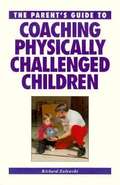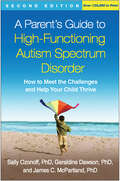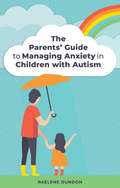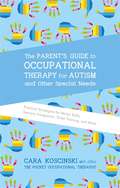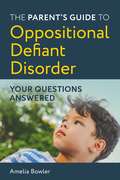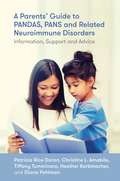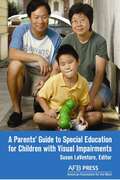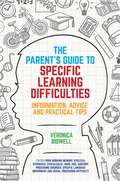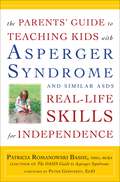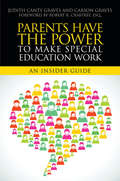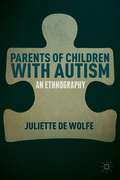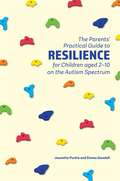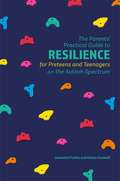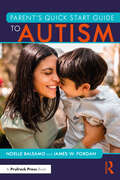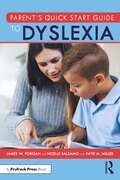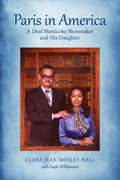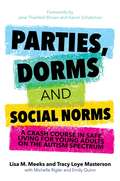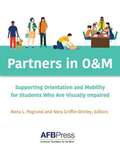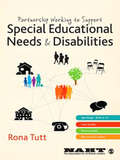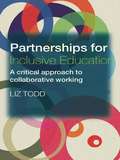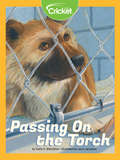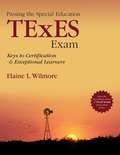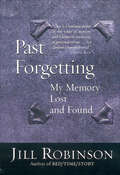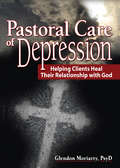- Table View
- List View
The Parents Guide to Coaching Physically Challenged Children
by Richard ZulewskiHandbooks in The Better Way Coaching Kids series serve as the perfect step-by-step introductory primers for parents and coaches. Written in an easy, conversational style, these books cover all the basic skill-building techniques, rules of the games, proper equipment and first aid. These guides focus on team spirit, the importance of fair play and overall fun. Special attention is paid to developing a child's confidence and self-esteem, -- all important keys to success.
Parent's Guide to High-Functioning Autism Spectrum Disorder, Second Edition: How to Meet the Challenges and Help Your Child Thrive
by Sally Ozonoff Geraldine Dawson James C. McpartlandMany tens of thousands of parents have found the facts they need about high-functioning autism spectrum disorder (ASD), including Asperger syndrome, in this indispensable guide. Leading experts show how you can work with your child's unique impairments--and harness his or her capabilities. Vivid stories and real-world examples illustrate ways to help kids with ASD relate more comfortably to peers, learn the rules of appropriate behavior, and succeed in school. You'll learn how ASD is diagnosed and what treatments and educational supports really work. Updated with the latest research and resources, the second edition clearly explains the implications of the DSM-5 diagnostic changes.
The Parents’ Guide to Managing Anxiety in Children with Autism
by Raelene DundonThis guide for parents is a complete introduction to autism and anxiety. Drawing on the author's clinical experience working with children and their families, it provides parents and carers with everything they need to know to help support their child. It covers the basics such as what anxiety is, how it manifests behaviourally and why it is common in autism, before presenting CBT-informed practical strategies for managing a common range of anxieties: separation, social, performance, phobias, and generalised anxiety. It also has chapters dedicated to related behaviours including Pathological Demand Avoidance (PDA) and advice on managing meltdowns.This is a clear, concise and practical guide that answers any questions that parents and carers might have about anxiety and provides support strategies to help children with autism manage a range of anxieties.
The Parent's Guide to Occupational Therapy for Autism and Other Special Needs: Practical Strategies for Motor Skills, Sensory Integration, Toilet Training, and More
by Cara KoscinskiWith the help of this handy guide, you can bring tried and tested occupational therapy activities into your home and encourage your child to succeed with everyday tasks while having fun in the process. This expanded edition of the award-winning book includes new advice on toilet training, coping with changes in routine, repetitive behaviors, self-regulation and much more. The simple explanations and easy exercises will soon make daily activities enjoyable and productive.
The Parent’s Guide to Oppositional Defiant Disorder: Your Questions Answered
by Amelia BowlerThis parenting guide to ODD offers expert information on your child's condition, provides insight and empathy to what they are going through, and equips and empowers you to make practical changes in your parenting approaches. It provides an overview of tried-and-tested techniques from a mother of a child with ODD to support you in response to typical questions you may have:· "Why is my child acting this way?"· "What does this say about me?"· "Why doesn't my child respond to punishment or reward?" · "What am I supposed to do next?"Overall this book teaches you how to avoid common mistakes in responding to ODD, the crossover with similar diagnoses such as ADHD and how to distinguish the disorders, how to improve your own resilience and confidence to communicate effectively with your strong-willed child, and start rebuilding the relationship you have.
A Parents’ Guide to PANDAS, PANS, and Related Neuroimmune Disorders: Information, Support, and Advice
by Patricia Rice Doran Christine Leininger Amabile Diana Pohlman Tiffany Tumminaro Heather Rain KorbmacherHaving a child who suddenly develops PANDAS (Pediatric Autoimmune Neuropsychiatric Disorders Associated with Strep), PANS (Pediatric Acute-onset Neuropsychiatric Syndrome) or related conditions such as encephalitis can be a daunting challenge for parents. This clear guide explains the symptoms and diagnosis of PANDAS and PANS, with treatment options and recommended strategies for supporting children at home, at school, and in community settings.The book covers key symptoms including OCD, tics, anxiety, sensory issues and personality changes, with practical advice on medical management, nutrition, lifestyle, and addressing social and behavioural needs. Each chapter also includes handy sidebars with key information to remember, and action steps for overcoming challenges, managing relapse, family self-care and providing children with the best possible support.
A Parents' Guide to Special Education for Children with Visual Impairments
by Susan LaventureThis handbook for parents, family members and caregivers of children with visual impairments explains special education services that these children are likely to need and to which they are entitled--and how to ensure that they receive them. Edited and written by experienced parents and professionals, this helpful and easy to use resource addresses the effect of visual impairment on a childs ability to learn and the services and educational programming that are essential for them to get the best education possible. Chapters address early intervention, assessment, different types of services, IEPs, accommodations and adaptations, different types of placements, children with other disabilities in addition to visual impairment, and negotiation and advocacy.
The Parents' Guide to Specific Learning Difficulties: Information, Advice and Practical Tips
by Veronica BidwellPacked full of advice and practical strategies for parents and educators, this book is a one-stop-shop for supporting children with Specific Learning Difficulties (SpLDs). Part one introduces a spectrum of SpLDs, ranging from poor working memory, dyslexia, dyspraxia, dyscalculia, through to ADHD, Autism Spectrum Disorder (ASD), Auditory Processing Disorder (APD), Specific Language Impairment and Visual Processing Difficulty. It explains clearly what each difficulty is, how it can affect a child's learning and how to help a child to succeed despite their difficulties. Part two includes a host of tips, tools and strategies to support your child's efforts in areas such as reading, writing, spelling and handwriting, as well as advice on motivation, confidence and managing life's setbacks. Written by an experienced Educational Psychologist, this is the perfect guide for parents and carers who are looking for ways to support their child's learning, as well as for educators and teachers looking for advice on how to differentiate lessons and motivate pupils with SpLDs.
The Parents' Guide to Teaching Kids with Asperger Syndrome and Similar ASDs Real-Life Skills for Independence
by Patricia Romanowski Peter GerhardtThe definitive resource for teaching kids with Asperger syndrome the life skills that build independence, confidence, and self-esteem. Children with autism spectrum disorders learn differently. Our kids' choices are too often limited and their paths to success restricted, not by a lack of intellectual ability but by deficits in acquiring, applying, and generalizing basic life skills. Success in school, at home, on the playground, and beyond depends on mastering countless basic living skills that most other kids just "pick up" almost by osmosis. This book shows parents how to teach these so-called easy skills to complex learners. This is the first book for parents and caregivers of kids with Asperger syndrome and similar learning profiles that features strategies based on applied behavior analysis--the most widely accepted, evidence-based, and effective teaching method for learners with ASDs--including how to: -Identify critical skills appropriate for your child's age--how to teach them and why-Implement new techniques that can replace, mimic, prompt, override, or impose missing order on your child's learning style -Design a curriculum for your child that reduces reliance on prompts (including parents) and promotes new learning, new behaviors, and independenceFrom the Trade Paperback edition.
Parents Have the Power to Make Special Education Work: An Insider Guide
by Judith Canty Graves Carson GravesWritten by parents who have been through the US special education system, this book cuts through the jargon to provide other parents with a no-nonsense road map full of valuable first-hand insights and tried-and-tested advice. The authors clearly describe: · the special education process, including the school hierarchies parents are likely to encounter and etiquette to be aware of when dealing with school personnel · the information parents should expect to see in school evaluations and Individualized Education Programs (IEPs), and what to do when this information is missing or insufficient · problems parents may encounter when the needs of the school conflict with the needs of a child, including how to deal with such situations and when to seek legal advice · the importance of organizing special education documentation and establishing a 'paper trail', and how to begin this process · why transition planning is so important, and transition services parents may want to consider for their child. Demonstrating that parents really do have the power to make special education work for their child, this empowering guide is essential reading for parents of children with disabilities who are new to the special education system in the US, as well as those who feel frustrated with the system.
Parents of Children with Autism
by Juliette De WolfeIn a readable and highly accessible ethnographic account that is shaped by the stories of families and the voices of parents, De Wolfe examines how parents of children with autism navigate the educational and medical systems, understand their own and their children's bodies, and support and educate one another.
The Parents' Practical Guide to Resilience for Children aged 2-10 on the Autism Spectrum: Two to Ten Years
by Jeanette Purkis Emma GoodallChildren and young people with autism have the capacity to be independent and resilient which can help them live independently or be supported to live a fulfilling life and reach their full potential. This book empowers parents of autistic children aged two to ten to help them promote resilience in their child. Full of suggestions and simple activities, this easy-to-use resource will help guide parents on how to build the foundations of resilience and independence for situations such as school, new environments and relationships with other children. It includes information about the main developmental stages for children on the autism spectrum, and will take parents through life events and milestones at different ages and identify where difficulties and barriers to resilience may arise and how to address them.
The Parents’ Practical Guide to Resilience for Preteens and Teenagers on the Autism Spectrum
by Jeanette Purkis Emma GoodallThis book empowers parents of autistic young people aged 11 to 20 to help them promote resilience in their child. Full of suggestions and simple activities, this easy-to-use resource will help guide parents on how to build the foundations of resilience and independence for situations such as negotiating sexuality and relationships, entering employment or living away from home. It includes information about the main developmental stages for preteens and teens on the autism spectrum, and will take parents through life events and milestones at different ages and identify where difficulties and barriers to resilience may arise and how to address them.
Parent's Quick Start Guide to Autism
by Noelle Balsamo James W. ForganParent’s Quick Start Guide to Autism provides parents and caregivers with an immediate overview of autism spectrum disorder (ASD) and steps they can take to support and encourage their child. Each chapter is packed with detailed and helpful information, covering what to do at home and at school, how to avoid common mistakes, and how (and when) to seek professional help. Summary and resource sections at the end of each chapter give quick guidance to busy readers. Topics include occupational therapy, applied behavior analysis (ABA), cognitive behavioral therapy (CBT), interventions, and more. Offering straightforward, easy to understand, and evidence-based information, this book is a go-to resource for caregivers parenting a child with autism.
Parent’s Quick Start Guide to Dyslexia
by James W. Forgan Noelle BalsamoParent’s Quick Start Guide to Dyslexia provides parents and caregivers with an immediate overview of dyslexia and steps they can take to support and encourage their child. Each chapter is packed with detailed and helpful information, covering identification, public schools versus private settings, and how (and when) to seek professional help. Summary and resource sections at the end of each chapter give quick guidance to busy readers. Topics include a wealth of research-backed activities, nurturing talent and creativity, motivating your child to read, and more. Offering straightforward, easy to understand, and evidence-based information, this book is a go-to resource for caregivers parenting a child with dyslexia.
Paris in America: A Deaf Nanticoke Shoemaker and His Daughter
by Clara Jean Hall Gayle WilliamsonClara Jean Mosley Hall has inhabited various cultural worlds in her life: Native American, African American, Deaf, and hearing. The hearing daughter of a Deaf Nanticoke Indian, who grew up in Dover, Delaware’s black community in the 1950s and 60s, Hall describes the intersections of these identities in Paris in America. By sharing her father’s experiences and relating her own struggles and successes, Hall honors her father’s legacy of hard work and perseverance and reveals the complexities of her own unique background. Hall was abandoned by her Deaf African-American mother at a young age and forged a close bond with her father, James Paris Mosley, who communicated with her in American Sign Language. Although his family was American Indian, they—like many other Nanticoke Indians of that region—had assimilated over time into Dover’s black community. Hall vividly recounts the social and cultural elements that shaped her, from Jim Crow to the forced integration of public schools, to JFK and Motown. As a CODA (Child of Deaf Adults) in a time when no accessibility or interpreting services were available, she was her father’s sole means of communication with the hearing world, a heavy responsibility for a child. After her turbulent teenage years, and with the encouragement of her future husband, she attended college and discovered that her skills as a fluent ASL user were a valuable asset in the field of education. Hall went on to become a college professor, mentor, philanthropist, and advocate for Deaf students from diverse backgrounds. Her memoir is a celebration of her family, her faith, her journey, and her heritage.
Parties, Dorms and Social Norms: A Crash Course in Safe Living for Young Adults on the Autism Spectrum
by Michelle Rigler Jane Thierfeld-Brown Aaron Schatzman Lisa M. Meeks Amy Rutherford Tracy Loye Masterson Emily QuinnThe late teens and twenties are exciting times, but filled with potential pitfalls as young people navigate the transition into independent adult life. This handbook is filled with the information that young people with ASD say they want (and need) to know about alcohol and drugs, social media and online safety, relationship types and boundaries, safe sex, stress and emotional health, and independent living. It includes real life examples, coping strategies and practical tips to help young adults with ASD stay safe while living life to the full. Informal and frank, this will be a go-to guide for young people on the autism spectrum.
Partners in O&M: Supporting Orientation and Mobility for Students Who Are Visually Impaired
by Rona L. Pogrund Nora Griffin-ShirleyPartners in O&M: Supporting Orientation and Mobility for Students Who Are Visually Impaired is a comprehensive text that serves as an introduction to the field of O&M, with a focus on professionals who work in collaboration with O&M specialists to support O&M instruction for students who are blind or visually impaired.
Partnership Working to Support Special Educational Needs & Disabilities
by Dr Rona TuttIn order to achieve the best outcomes for all children and young people, schools must work in partnership with students, parents, other professionals and the wider community. In this changing landscape of education, the notion of the traditional school is fast disappearing. This book looks at what is possible in this exciting new world, and how some teachers and other professionals are putting into practice the best principles of multi-agency working. Finding innovative ways of supporting children and young people with special educational needs and disabilities (SEND) in this context is more important than ever, as children are being diagnosed with increasingly complex needs. Those working with children need to be aware of the fresh opportunities that are opening up and which can help every individual to maximise their full potential. This book examines how partnership working affects children with SEND by considering: - the diversity of additional needs; - the role of specialist schools that have an SEN specialism; - partnership working between mainstream and special schools; - partnership working with groups of schools, including those that are co-located or federated; - the growth of academies and trust schools; - schools and other services working together; - the work of extended schools and children's centres; - a wide range of other services for children, young people and families. Filled with case studies of effective practice from real schools and services, this book is a must-have for those looking at how to work together to achieve positive outcomes for all. Rona Tutt OBE is a Past President of the National Association of Head Teachers (NAHT) and works as a consultant, writer and researcher on all matters relating to education in general, and special educational needs and disabilities in particular.
Partnerships for Inclusive Education: A Critical Approach to Collaborative Working
by Liz ToddShortlisted for the NASEN/TES 2007 Book Award Increased partnership between professionals, particularly through the integration of services, indicates a major opportunity for child and parent participation, but one that seems in danger of being side-stepped. Drawing on substantial research evidence, this book looks at reasons for this situation; what is happening now, what developments and initiatives have been tried and what can be done to develop a culture of participation? Some of the main threats to participation are discussed in this book including: Has ‘partnership’ ever been? Who is excluded from 'partnership'? Which discourses have made participation illusive and what are the implications – theoretical and practical - for how we move forward? Partnerships for Inclusive Education includes a helpful framework map which guides critical thinking towards the development of a culture of collaboration and presents original and stimulating ideas to open up the complex processes that can frustrate participative practice. Combining socio-cultural ideas with post-structural thinking gives this book a strong yet accessible theoretical basis, making it a valuable resource to both an academic and a professional educational audience.
Passing On the Torch
by Claire H. BlatchfordWhen Ginger, a hearing-ear dog, begins to go deaf herself, her owner must find another dog to help them both. Her owner pays a visit to the pound and finds Leo! Will he be able to help them hear?
Passing the Special Education TExES Exam: Keys to Certification and Exceptional Learners
by Elaine L. WilmoreGain confidence, lower stress, and raise your TExES exam scores! In this artful guide, TExES test prep veteran Elaine Wilmore breaks down the EC-12 and Supplemental special education test so you can feel calm and confident on test day. Built on her successful test-prep training seminars, she shows how to think like the test was developed and covers: Each special education domain and competency Philosophies behind the test questions Teaching stories that improve answer recall Tips for analyzing test questions Ways to use key words and concepts to improve test results Techniques for in-state and out-of-state test takers
Past Forgetting: My Memory Lost and Found
by Jill RobinsonA love story, a mystery, and a memory guide, Past Forgetting shows a writer's determination to re-create her life.Jill Robinson, novelist and author of Bed/Time/Story, wakes from a coma to discover she's lost her memory and just about any sense of who she was.And is.She likes the look of the man standing next to her bed, but doesn't recognize that he's her husband, Stuart. What matters is that she feels safe around him. As she searches the house for her children, she is reminded that her son and daughter are both grown with families of their own--how well did she ever know them? Can You make up for a past you don't really remember?It is Stuart who begins to fill in the details for Jill, including the fact that she's a well-known writer, although when she meets with her doctors, they say she may never write again.Against all odds, Jill Robinson retrieved her unique writing voice, and in this engaging memoir shows how she does it. She takes us with her on her exploration of'tlie connections between memory and creativity, celebrity and anonymity, and loss and discovery. From her first tentative steps outside her house on Wimpole Street to London's sleek West End. From a trip to Oxford to discuss memory with a professor to her amazing voyage to Los Angeles on an assignment for Vanity fair which takes her back to the sixties world of Hockney, Polanski, and Hopper, Jill forges new paths to memory.In Past Forgetting, Jill Robinson rediscovers friendships she doesn't know she had: Robert Redford tells her stories about her childhood; at John Lahr's London literary teas, she's reintroduced to the writer's world, and Cary Grant offers her memories of her father, Dore Schary. And being with Barbra Streisand reminds her of a time she doesn't quite remember: when her father was running MGM.In her urgent voyage to redefine herself, Jill asks all the questions you've ever asked on the nature of memory. Is recollection shadowed by emotion? Is memory an act of reinvention? Do people reinvent rather than recollect? In Past Forgetting you'll find the answers and you'll meet a writer you won't want to forget.
Pastoral Care of Depression: Helping Clients Heal Their Relationship with God
by Glendon MoriartyThis book provides the essential tools needed to transform negative God images in depressed clients! Pastoral Care of Depression: Helping Clients Heal Their Relationship with God is designed to help clergy and mental health professionals understand how depression negatively affects the way people emotionally experience God and how, through therapy, this hurtful God image can be changed into a much more positive one focused on healing.In the past, the God image (as well as the essential differentiation between God image and God concept) has been explained in dull, analytic terms that are difficult to understand. This book&’s jargon-free language and engaging presentation make it an effective learning tool for students and professionals alike. Inside, you&’ll find numerous psychological tests, complete with sample test forms, that identify the God image. These are clearly explained and include all the information needed to take, administer, and interpret them. Pastoral Care of Depression teaches you to use psychodynamic and cognitive interventions to change a client&’s God image, including foundational knowledge and clearly presented techniques to implement in the therapeutic relationship. This comprehensive treatment manual arms you with the most comprehensive array of cognitive interventions published to date, with tens of easy-to-follow techniques designed to tap directly into an individual&’s subjective experience of God. Two appendixes give you a sample God Image Automatic Thought Record and Treatment Plan form.Part I: Depression and the God Image examines: the nature and development of depression symptoms of depression specific to religious people defining a client&’s image of God, how it developed, and what it reveals the relationship between self, depression, and God image, and how God images relate to Christian thoughtPart II: Changing the God Image addresses: the importance of self-evaluation for therapists and counselors-and how to do it the nature of the therapeutic relationship counseling skills that strengthen the therapeutic relationship how to conduct an God Image Assessment Interview and how to work with what that interview reveals transference, countertransference, cyclical maladaptive patterns, and internalization in psychodynamic psychotherapy appropriate, effective psychodynamic interventions the essentials of cognitive therapy and how it can be utilized to positively affect the God image treatment planning and case conceptualization important ethical issues for considerationWith well-designed test and exercise forms and clear instructions on their use and interpretation, Pastoral Care of Depression provides the essential tools needed to work effectively with this important client group. Make it a part of your professional/teaching collection today!
Pastoral Care with handicapped Persons
by Lowell G. ColstonDescribes the role pastors play in the lives of people with disabilities.
